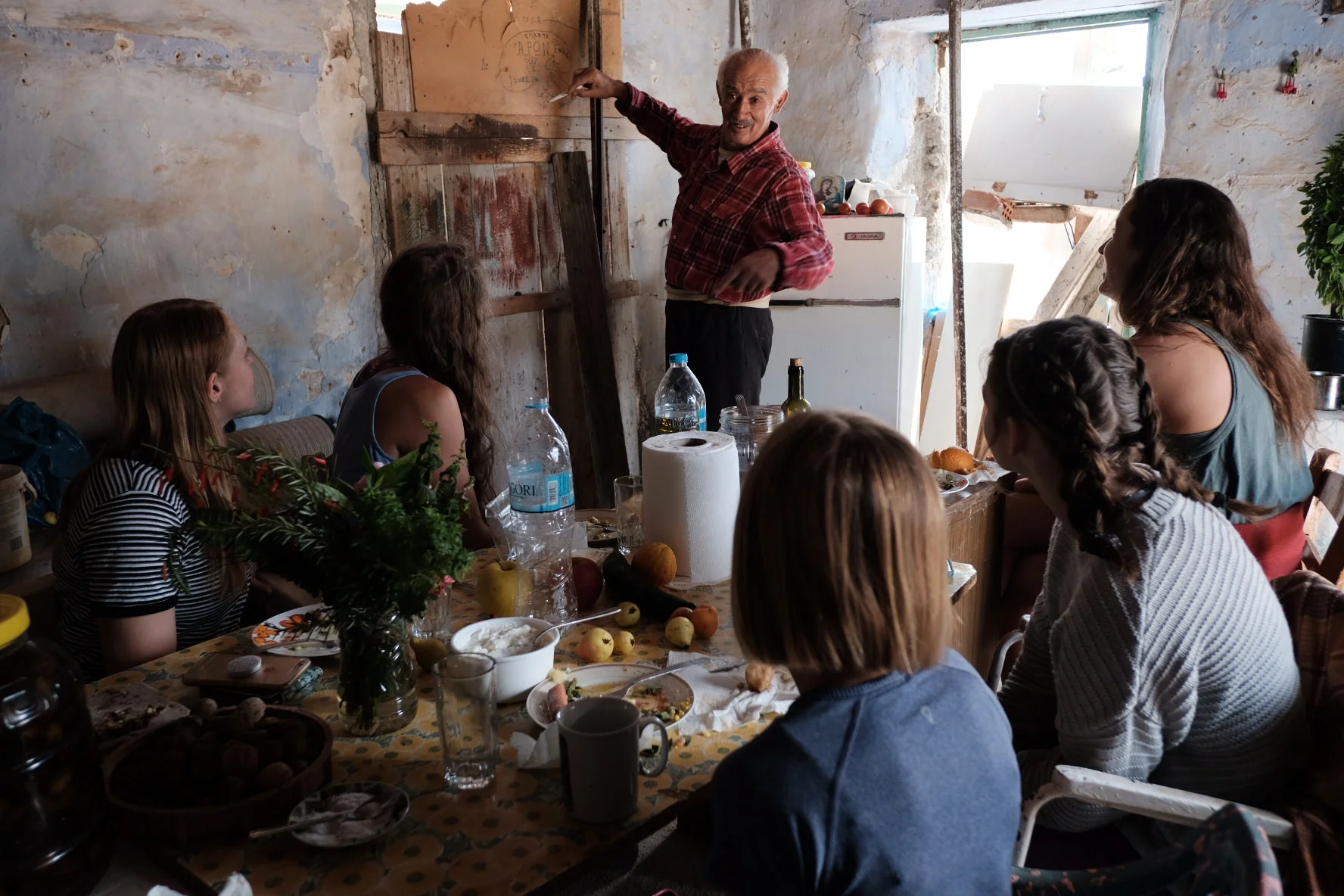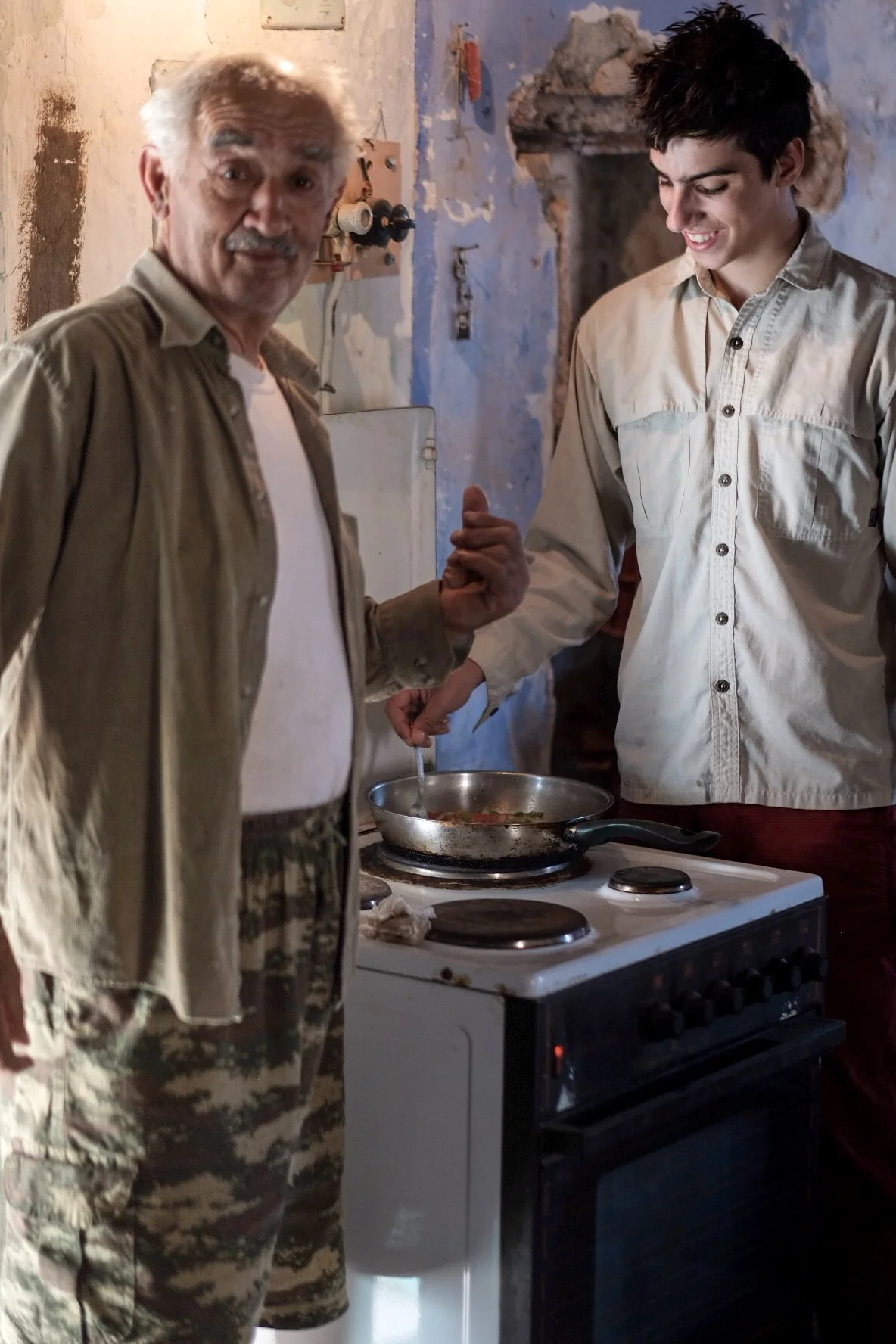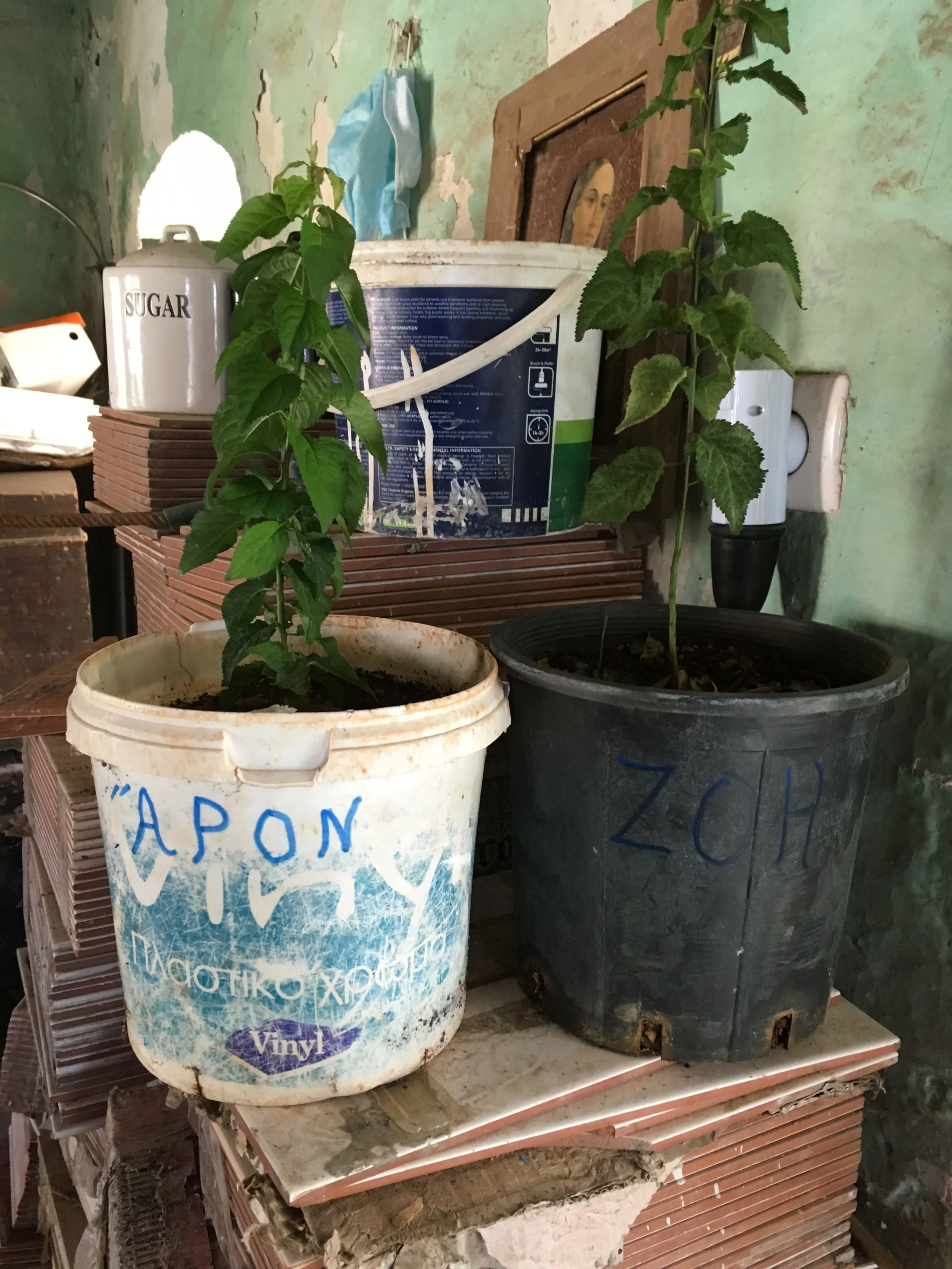Our Friend Gus
“I love to give. I love to give to the people!” proclaims Gus, our gracious breakfast host, as he dishes out platefuls of omelette drenched in homemade olive oil. We sit in one of the small buildings on his property, a concrete box with a vaulted log roof that dates back at least 300 years. The walls have no windows or doors, and a slight breeze wafts through, coming from the Mediterranean, just a few kilometers to the east. We stuff our faces with more food than we know what to do with: fresh bread, honey, watermelon, tomatoes, pears. All of this is local, either from his garden, farms, or provided by his friends in the tiny village of Richea, on the eastern coast of Greece’s Peloponnese peninsula. We were living in this village for 18 days while exploring the world class sport climbing of Kyparissi, another tiny hamlet sitting directly on the coast of the Myrtoan Sea.
“This is the most important thing: to eat good food. I don’t like the chemicals. My food is natural. I just picked these pears this morning. I get up at 5 o’clock…went to feed my pigs and to take some fruit from the trees. I like to get up early. 5 o’clock every morning.” Gus shuffles around the room, cooking more omelette on a gas burner. The pan is filled with olive oil. He has me whisk some fresh eggs, adding a little bit of salt and pepper, before pouring it into the pan. It’s easy to see how the average Greek citizen consumes something like 20 gallons of olive oil a year when it is used like this.
Gus writes our name in Greek after serving an abundance of food.
Konstantinos “Gus” Kokkoris was born on March 13, 1949, in Molaoi, Lakonia, Greece. According to the lore surrounding his birth, there were two meters of snow on the ground in his village, and this is what made him so strong. His mother gave birth to twins, but his sister did not survive. Gus spent the next 16 years growing up in Richea, which seems to have a few hundred residents, and where farming is the main source of subsistence.
On our second morning in Richea, I convince Jonas to accompany me to the center of the village, to look for groceries and internet. While a cup of espresso distracts my jet lagged brain, we settle in at an outdoor table where everyone sitting near us is at least 20 years my senior. It’s 9 am and perhaps a dozen elderly men are seated, drinking coffee or beer, and presumably, gossiping about the goings on of the village. We do not find a wifi signal, but what we end up acquiring is more valuable than any news from the outside world.
“Where are you from?” a friendly man asks from a few tables away. He has on a baseball cap and is wearing camo cargo shorts. We reply that we are from the U.S. “New York? I live in New York City for 35 years. God bless America!” He says this proudly; with a tone of defiance. “America is the greatest country in the world!” I can’t tell if he is joking. We don’t know this man’s story, and based on the “diplomatic” strategy of our current president, I’m wondering if he is trying to goad me, or possibly set me up. “Thank you,” I reply with as much humility as I can muster, trying to feel his sentiment, while simultaneously burning with shame and embarrassment.
He picks up his coffee cup and comes over to sit by us. In Greece, chairs in the center square cafes are usually arranged to point inward, and this is how most of the men who gather here sit. It’s a bit unnerving when walking by, but now I feel like I’m becoming part of the conversation, and not the subject of banter. The locals are genuinely curious as to why there is a group of 8 Americans, of whom 6 are teens, suddenly in their home.
Gus critiques Jonas's cooking skills during our first visit.
Gus launches into a mini monologue on his time in the U.S. He worked as a cook for 30-some years at a huge diner in Manhattan, rising every morning at 5 to make hundreds of omelettes, pancakes, and whatever else was assembled using the 2000 eggs consumed between the hours of 7 and 11. He told us of his first, second, and third wife; the whereabouts of whom are now unknown.
And after what seems to be only a few minutes of conversation, Gus invites Jonas and I to his house for breakfast. We oblige, he buys a loaf of bread, some eggs, some cheese from the market, and we’re off. The entire village is within walking distance; we’re at his house shortly. He opens the plastic gate to his patio filled with potted plants of all shapes and sizes, and leads us into the ramshackle dwelling where we would end up spending a significant amount of time in the weeks to come.
Our first visit with Gus was an erudite journey into the heart and soul of rural life in Greece. Although we have no way of knowing whether or not Gus represented the true character of Greece, his demonstration of humility and generosity seemed to capture the essence of his country.
Upon arriving at his house, he procures a small plastic water bottle filled with olive oil. “This is my oil. It is the best.” He pours a capful and takes a shot. “This is the best. Do this everyday. It is the best medicine. All natural.” Gus pours us shots of the greenish yellow oil and we put it back. It coats my lips and throat and then the bite hits: a tangy sharpness that can be felt in the back of the mouth. I’ve never had anything like it. “This is the best olive oil I’ve ever had,” I confess. And as if he didn’t hear me say it, or because he knows it’s the best olive oil, he just continues on, arranging the shed for breakfast.
Soon, we’re eating eggs fried in oil, eating fresh pears, and drinking water he pulled from a well with a bucket. “Don’t drink the water from bottles. Water should come from the ground. This is the best.” He takes a loaf of bread and holds it to his chest. With a small knife carves a cross in it three times. “Did you just bless it?” I ask. “Yes, every time. I ask Jesus to bless it.” He looks at an illustration of Jesus that rests about his cooktop. “Jesus is love. He gives to the people. I try to be like Jesus.”
We break bread, or rather, Gus cuts us slices while holding the bread against his breast, the blade of his knife just inches away from his heart. While we spread local honey on it, he shows us a photo with the likeness of Jesus contained within a tree. He begins to weep. Gus is a deeply spiritual man whose life is rich with blessings. He thanks Jesus for his blessings, and has vowed to live his life in the style of his lord. “Jesus gave to the people. All people. He didn’t turn away the hungry, or the sick. He loved all the people. I try to love all the people. I want to give to all the people.” In an instant, the wealth and privilege I have fills me with guilt. I wonder if I can be more like Gus, or Jesus, or just less of a privileged white American male. I bury the shame and enjoy what Gus is sharing. An hour or so goes by and after endless consumption of Gus’s bounty, we make our way to the door and depart, bottle of oil in hand, and a few other gifts. He insists that we return the next morning.
The illustration of Jesus that hangs above Gus's stove.
At 69, Gus still works everyday. He collects a Social Security check and Medicare payments from his time working in the US as well as Greek benefits. He owns multiple parcels of land, and farms all of them: olives, pears, potatoes, tomatoes, peppers, livestock, and more. He drives a 1970s Datsun pickup truck and has a tiny Fiat hatchback that he uses to make the 30km drive up a treacherous road over to Molaoi. His tractor rests in the cavernous “garage” under the shed, and is surrounded by tools, farm implements, and all of the other accoutrements of generations of rural life inhabiting this property. One if his many stories details how he "died" after rolling his tractor on a nearby hillside. He lost all of his teeth and was found unconscious and without a pulse. He later came to and has since seemed to regain all strength and zest for life.
The next time we see Gus, the next day in fact, Jonas takes Emilee in lieu of me. I had bowed out in order to do some yoga to address the tightness received from travelling. The two return with more food, more stories, and Gus’s invitation to bring the entire group the next day. Gus has instructed Jonas to rub olive oil on my lower back, which had experienced a slight spasm the day before.
The following day, we return to Gus’s with the entire group. We get ogled as we walk through the center of the village, but the menfolk are friendly, a few of them offering a “yassis,” which is the most common greeting, especially in the morning. Upon arriving at Gus’s, he welcomes us warmly, and has the table ready. We eat eggs, vegetables, bread, honey, tea, coffee, and more of everything. We cook potatoes in a pan filled with olive oil. He made enough food to feed 5,000, and we’re only 8. Gus is like Jesus, he speaks in parable and feeds the many. He cleans his vegetables with copious amounts of fresh water, which falls to the floor, upon which he steps…he walks on water. Gus tells stories about his time in New York, including when he met Richard Nixon. He learns our names, which he writes in Greek. He feeds us more. He then tells us about a “secret” beach, which is past his property and has the cleanest water in the Mediterranean. We agree to go there with him, and we hurry home to prepare. After he arrives at our house, we follow his Datsun down the treacherous road, making a stop at one of his farms to gather pears. Another kilometer towards the coast, and we’re met with an absolutely brilliant view of a secluded beach. Gus exclaims proudly that he built this road with his own money, money that he earned while working in the United States. This is why he states so assuredly, that the U.S.A. is the greatest country on earth, and for God to bless the U.S.A. And he’s also a bit bitter. “Nobody thanks me. I built this road. Nobody thanks me.” The road doesn’t quite make it to the beach, and so we park, walking the last km down to what is one of Greece’s most remote and most spectacular beaches.
A glimpse of the "secret" beach below one of Gus's farms.
After a few hours of having the beach to ourselves, we make the trek back up the hill, and stop by a large concrete cistern that Gus built to store water for his orchards. As we sparkle in the sunshine we echo Gus’s words like parrots, “It’s paradise. Everyday. I get sick of it!”
We return to Gus’s 3 or 4 more times over the course of our stay, always for breakfast. His generosity is overwhelming at times, but it’s impossible to resist. He gives us clothing, jewelry, endless amounts of food, and stories. He shows us relics of his time in the U.S.: his Selective Service registration and a driver’s license. Gus shares some poetry with us, including something about President Kennedy. “I remember when he was killed. We all cried.” He indicates he was in New York when it happened, which doesn’t quite add up with the timeline, but this is trivial. Gus’s final gifts are one liter bottles of his exclusive oil. As we depart his home for the final time, he insists that we’ll see him again.
Gus even named some of his potted herbs and vegetables after us.
The group with Gus and his tractor. Jonas is behind the camera.
I hope to return to Gus's place in Richea in October with our Gap Semester program, when Gus will be harvesting his olive crop. -Aaron






